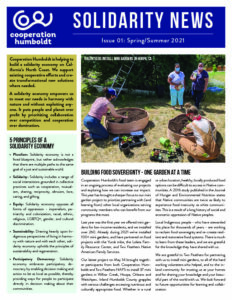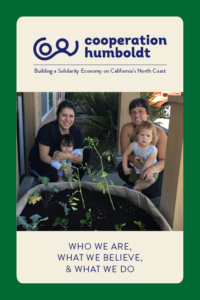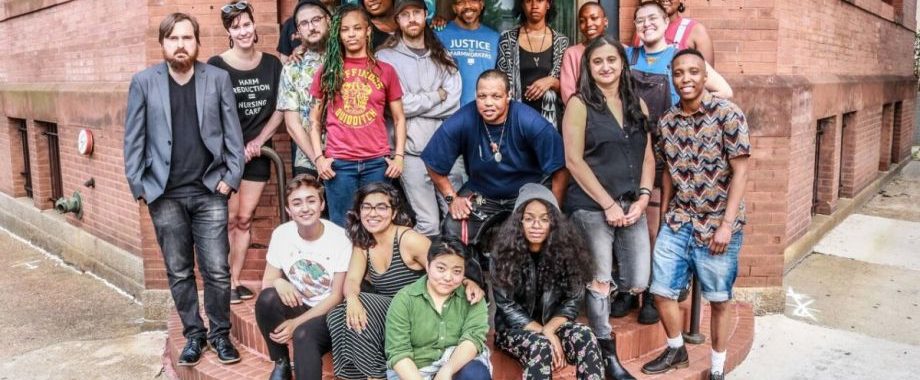Category Archives: Uncategorized
2020 Mini Garden Recipients Invited to Supplies Giveaway 4/25/2021

If you received a mini garden last year from Cooperation Humboldt, you’re invited to a supplies giveaway on Sunday, April 25th from noon-2:00 p.m. at the parking lot across from Redwood Acres in Eureka. We’ll have bags of compost (so you can add nutrients to your soil to prepare it for another year’s planting) and plant starts available for free, plus educational materials and experienced gardeners on hand to answer questions.
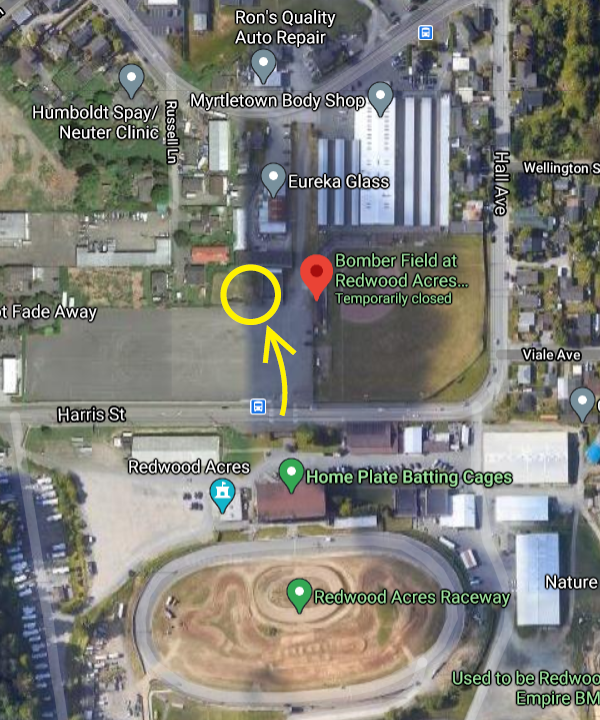
Questions? Email tamara.mcfarland@cooperationhumboldt.com.
LOCALS HONOR INDIGENOUS PEOPLES’ DAY
EUREKA, CA (October 8, 2020) – Indigenous Peoples’ Day is a holiday that honors Native peoples and commemorates their histories and cultures. It is celebrated across the United States on the second Monday in October, which falls on Monday, October 12 this year. Cooperation Humboldt encourages residents to mark Indigenous Peoples’ Day this year by participating in a voluntary tax called the Honor Tax. Detailed information is available at https://cooperationhumboldt.com/wiyot-honor-tax/.
An Honor Tax is a tangible way of honoring the sovereignty of Native Nations. It is called a tax because it’s not a gift or donation. The tax is voluntary, and the amount is decided by the individual/organization, and is paid directly to the historical inhabitants of the place where one currently lives and/or works. For those of us who live in the greater Wigi (Humboldt Bay) area, those historical inhabitants are the Wiyot Tribe. Those who live outside the greater Humboldt Bay area can look up their appropriate Tribal entity at https://native-land.ca/.
According to Wiyot Tribal Administrator Michelle Vassel, “Tribal governments provide essential service to their citizens. Other governments tax property, land, and income in order to provide these services. Tribal Governments cannot do this as their ancestral territory is occupied. We cannot tax our own people because they are already paying local, state, and federal taxes and tribal lands are held in trust by the federal government, or being taxed by other governments. The Wiyot Tribe operates primarily on grant funding. That places Tribes in a position of being subject to the whims of the federal government and nonprofit foundations which often dictate how funds must be spent. For me, the Honor tax is a really important tool to develop economic sovereignty because it allows us to choose how we spend funds with no strings attached.”
A growing number of individuals, businesses, and nonprofits locally have recognized the importance of the Honor Tax and have committed to paying it on a regular basis. Some pay monthly, and others annually. The amounts vary.
Earlier this year, College of the Redwoods began paying the Wiyot Honor Tax. Marty Coelho, Executive Director of College Advancement and the CR Foundation shares, “Our college believes that it is important to commit to an Honor Tax in recognition of the history and legacy of the Wiyot Tribe and acknowledge that the CR Eureka campus occupies former Wiyot tribal land. Being able to provide funds which in turn will help support services for Wiyot elders and youth, is not only a good thing to do, it’s the right thing to do.”
In 2019 Cooperation Humboldt resolved to pay 1% of its gross annual income to the Wiyot Tribe as an Honor Tax in perpetuity. “In addition to working in all of our program areas to center the needs and perspectives of Indigenous peoples, and developing authentic relationships and partnerships with local Tribal entities, we believe that payment of this voluntary tax is an essential piece of moving toward reconciliation and repair of relationships that have been deeply damaged by hundreds of years of inequality and genocide,” explains Tamara McFarland, a board member of Cooperation Humboldt.
The Humboldt Unitarian Universalist Fellowship, also participates in the Honor Tax. “We’re grateful for the opportunity to take up a special collection every year to pay our Honor Tax to the Wiyot Tribe. It reminds us of the historical injustice visited upon the Wiyot people by colonist predecessors and gives us a chance to align in a small way with what we hope will become meaningful reparations,” says Richard Kossow of HUUF’s Social Action Committee.
Some of the people who pay this tax prefer to do so anonymously because they do not wish to use the Honor Tax as a way to promote themselves as businesses or individuals, but prefer to keep the focus on Indigenous peoples. One Arcata business owner who pays the Honor Tax and wishes to remain anonymous shares, “It’s important to me to pay the tax because it recognizes the sovereignty of Indigenous Nations. It also represents a recognition that most of us are living on stolen land, and that’s generally not something that we are forced to recognize in any formal way in our daily lives. It’s also a way to acknowledge that Indigenous People are still here as active and vibrant members of our communities, and to honor the fact that we have so much to learn and gain from their continued presence.”
Another meaningful way to honor Indigenous People’s Day this year is by participating in Humboldt State University’s Native American Center for Academic Excellence’s Indigenous People’s Week celebration, which kicks off on Monday, October 12th at noon, and includes educational Zoom sessions focused on Indigenous experiences and perspectives all week long. More information is available at https://itepp.humboldt.edu/indigenous-peoples-week.
9/10/2020 Email Blast
The COVID pandemic. The Floyd Rebellion. Wildfires. It’s just soo much. We take solace and comfort in remembering that we are all in this together, and that is the only way we will get through it– TOGETHER.
Here are two upcoming opportunities to learn more about what that means for us.
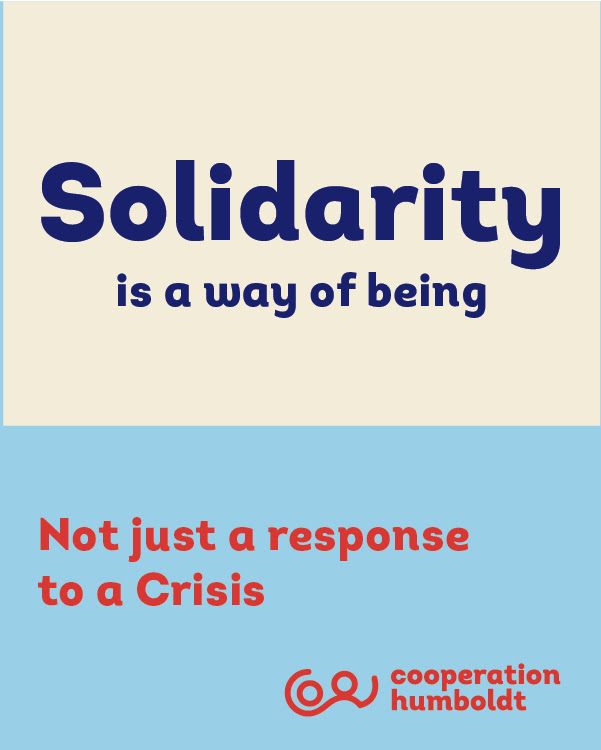
Monday, Sept14 at 6pm we will be hosting a virtual “Introduction to Cooperation Humboldt.” If you were ever curious about who Cooperation Humboldt is, what we do, and how you can get involved, this is for you!
Join core team member Marina Lopez and co-founder Ruthi Engelke for an introduction into the who, what, why, and when of Cooperation Humboldt. They will provide an overview of the organization, our theory of change, the principles of a Solidarity Economy, and how each project fits into creating a Solidarity Economy right here on the North Coast of California.
Zoom Link: https://us02web.zoom.us/j/
Meeting ID: 820 6642 8357
Passcode: Cooperate

Sat, Sept 19 at 12pm we will host a virtual gathering to share our efforts to create an Ecovillage Development in northern Humboldt County. Our goal is to create a community based on sustainable food, energy and housing practices. We are looking for people who share a similar vision for life in the 21st century, value consensus-based decision making, and are looking to live in a multi-generational village of 10 to 25 people. The current founders group envisions some tiny homes and many common facilities; a workshop for creative reuse projects; a medicinal herb, native plant, and food garden; an arts & media production center; and a commercial kitchen to create a functional live and work environment.
Are you interested in a smaller or bigger village, or a spot farther flung from town? Do you have a theme around which you wish to develop the culture of your village? This is just one beginning, and we want to hear from you. Cooperation Humboldt is offering resources, support, and is helping to incubate an independent network of many ecovillages. Come join us for an Introductory Meeting where we will discuss all of the components, explore available properties, and help you network with like-minded builders and dreamers.
https://us02web.zoom.us/j/
We hope to see you soon,
Your friends at Cooperation Humboldt
——————————
If you aren’t already, would you consider joining Cooperation Humboldt as a sustaining monthly donor? You can chose an amount that works for your budget from $10, $25, or more! Your contribution goes a long way to support the diverse community-centered work we do together!
As always, please reach out to us with your own dreams, ideas, and plans. Please be sure to follow us on Facebook and Instagram to stay up to date on how Cooperation Humboldt empowers our community to build a brighter future!
Cooperation Humboldt & Lost Foods – Native Garden Tour, July 2020

Cooperation Humboldt & Lost Foods – Native Garden Tour, July 2020 by Cooperation Humboldt is licensed under a Creative Commons Attribution-NonCommercial-ShareAlike 4.0 International License.
Feminist Leadership and the Co-owner Mindset for Worker Owned Cooperatives
“From each according to [their] ability, to each according to [their] needs.”
As children most of us tend to either accept the authority of our primary care providers or reject it – rarely do children have the opportunity to exercise autonomy or true collaboration with adults. It’s the same in school: the teacher is the authority and we are required to do as we are told, even when we are collaborating with our peers. As adults we become the parents and the teachers, exercising our authority over children, continuing the cycle of power-over indoctrination. When we enter the workforce, we either become employees or employers – we either hold ultimate financial and governance authority, or we obey that authority.
Most of us have little experience with non-hierarchical, collaborative power-with cooperation with a group of our peers. When we decide to start a worker owned cooperative, we like the idea, we study the idea, but we have very little experience putting it into practice. Our deeply ingrained power-over habits tend to take over in times of stress. Since owning and running a business is often stressful, that means our deeply ingrained power-over habits often take charge. We revert to what we know best.
Power-over behaviors often manifest as:
- Raising our voices, speaking rapidly, speaking a lot
- Pushing our ideas forward without hearing others
- Displaying negative emotions to make others uncomfortable so they will capitulate
- Passive and passive aggressive language
- Turning away from essential communication
- Getting frustrated with what we perceive as the inadequacies of others
- Complaining to others about what we perceive as the inadequacies of others
- Forming cliques and group divisions
- Taking over someone’s task just to get the job done
- Dropping the ball or quitting because it isn’t worth our time and effort any more
In order to counteract our tendency to revert to these and other power-over behaviors, it is essential that co-op owners learn and use a democratic process for task management, communication, decision-making, and accountability. This should not be an informal process – it should be intentional and deliberate. When selecting our frameworks for cooperation, we do not expect to succeed immediately. Working with a method of cooperation is the consistent and ongoing exercise of “failing forward.”
Failing forward is about leveraging and learning from mistakes. It is about making a realistic assessment of risks and learning to live with the downside and experiment with new approaches. Failing forward is an investment in human success. It is not only necessary, it is essential. Because we will fail. The question is what we do after a failure. When communication breaks down, when power struggles emerge, instead of reverting to our deeply ingrained power-over instincts, we look to our framework and our mentors for guidance.
Initial inspiration for a new idea or project often comes from one person. Someone thinks, “I want to start a worker owned cooperative,” and then they set out to do just that. They research their idea, they sign up for classes, they begin to gather a group of similarly interested people. In many cases, the person who does this initial work is a person who is used to taking a leadership position. Perhaps they are an older sibling; perhaps they cared for their parents or lived on their own. Perhaps they were consistently put in a leadership position because of the structures of white supremacy; perhaps they have money. Perhaps they are just that kind of person. There are many reasons why some of us end up in leadership positions. No matter what the reason, almost all of us were raised in a culture that puts that kind of person in power-over relationships. Cooperative groups do this unless we learn new systems and processes. Some of us will accidentally slip into positions of leadership and some into positions of subordination.
For those of us who find ourselves in leadership positions within our groups, it is our responsibility to use that power to redirect the group’s attention back to the fundamental cooperative structure, and to constantly look for opportunities to divest ourselves of our power-over position and shift to power-with. Some of us will be more comfortable and capable of understanding the cooperative structure and holding ourselves accountable within that structure. It is our responsibility to act as mentors, and to find teachable moments to offer pathways for redirection. It is challenging to accomplish this without falling into a power-over position, telling others what they should and shouldn’t do.
One of the simplest and most effective tools we can use is a question rather than a statement or a command. “Would anyone like to take on the task of improving our meeting facilitation so that I’m not always the one taking the lead?”
For those of us who find ourselves subordinate to others in the group – either by choice, by accident, or because others in the group have fallen into power-over behaviors – it is our responsibility to share our experiences directly with the group. Ideally, we communicate our experiences as they are happening. The practice of Non-violent Communication (NVC) is an excellent tool to learn to do this. Groups that choose to study and practice NVC together are more likely to recognize what is happening and be prepared to actively listen when someone in the group shares how they are feeling and why. “When you just raised your voice, I felt uncomfortable. I stopped listening and became defensive. Will you please use a different tone of voice so that I can better hear what you are saying?” To accomplish this kind of effective communication, we must study, practice, and fail forward, again and again.
Another reason that we find ourselves in subordinate positions has to do with accountability. If a person isn’t accomplishing their tasks in a timely or effective manner, the group will naturally contract around those who are, shifting the balance of power in order to keep things moving along. Because of our deeply ingrained capitalist mindset, we may respond to that lack of follow-through by unconsciously assuming a sense of superiority. For those of us who find ourselves taking on more responsibility when others are falling short, we can practice asking, “Why is this person not showing up? How can I help?” rather than saying, “This person isn’t showing up, so now I have to do their job, and I resent that.”
Assume good intent. Recognize that energy fluctuates, circumstances fluctuate, and everyone is always learning. Cooperation and equity do not mean stability and equality, they mean flexibility and mutualism. It is healthy for us to take the burden from our comrades when they are tired.
When we are the ones dropping the ball, we can ask ourselves, “What kind of support do I need right now?” The idea that a person must maintain maximum productivity at all times without faltering or fluctuating is an extractive capitalist mindset that has no place in a regenerative feminist economy. Of course, if a person shows no signs of taking care of themselves or others, then eventually they will so blatantly violate the agreements of the co-op that a well designed governance and accountability structure will provide the pathway for their movement out of the group. But not before the group nourishes, heals, and supports that person as best we can.
Those of us who tend to find ourselves in leadership positions have the responsibility to empower, mentor, and support those of us who find ourselves more frequently subordinating to others. But our mentorship is not accomplished by delegating responsibilities, telling others how they can improve, or directly or indirectly punishing or rewarding others with blame, praise, and social capital. That’s how parents, teachers, and employers do it in patriarchal systems. Instead, we nurture everyone in the group. We are a garden. Before we bear fruit, we must sprout and grow. Then, we will cycle down. We need different things at different times. The process of mentoring a person who has not had many opportunities for leadership is a slow dance of offering resources and opportunities, and stepping back to let nature do what nature does best.
Those of us who tend to find ourselves in subordinate positions have the responsibility to resist the structures of patriarchy, white supremacy, capitalism, and colonialism that have taken our bodies and our minds as resources to be extracted. When we see those forces at play within ourselves and our cooperative members, our work is to look deeper into the heart and soul of everyone involved, and to heal the wounds inflicted upon our people, by our people, for generation upon generation. When we do so we will heal ourselves and each other, and develop the strength to step up and take co-ownership. When for our whole lives our value is measured by what we produce, while at the same time the value of what we produce is taken from us, our healing is to discover the inherent value of all people and resources, and then to treat all people as precious, starting with ourselves.
When we see ourselves as co-owners and we have the space, support, and capacity to act as co-owners, we don’t just think about our own needs and our own responsibilities. We see the interconnectedness of all living things, and begin to see our proper place within that interconnectedness.
Because we are so used to compartmentalized work environments with tasks assigned to us by others, it takes some time to adopt an ownership perspective. In practice, being a worker-owner means being able to accomplish direct, important tasks on the ground-level (worker) and to walk up the mountain and look over the whole ecosystem to see our broader relationships (owner). If we find ourselves stuck in one perspective or another – either bogged down in the details, micromanaging others, or up with our heads in the clouds of fantasy and idealism – then it’s time to take a walk, either up the mountain, or down into the valley. No worker-owner is going to be in both places at once, but over time we can develop trust that no matter where our comrades are, they are taking care of us all, and needing the care of us all.
Turn a laundry basket into a strawberry planter!
If you have a spare plastic laundry basket/hamper sitting around somewhere, why not put it to good use and grow strawberries in it? Here’s one way you can do that, though of course many variations are possible.
You’ll need –
- laundry basket/hamper
- soil
- plastic trash bag, burlap, or weed mat
- strawberry starts (look for small ones without a lot of greenery yet, or bare root)
- other plants for the top (optional; you can also just plant more strawberries there)
- scissors
The first step is to add some drainage holes to the bottom of your basket. We used a drill, but if you don’t have one, you could cut some slits with a razor blade, scissors, etc.
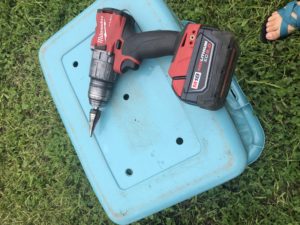
Next, position your plastic trash bag inside to keep the soil from falling out of the holes in the basket. (Alternately, you could use burlap or weed mat, in which case you’d just line the sides, no need to line the bottom.) We cut holes in the bottom of the plastic bag that lined up with the holes drilled in the bottom of the basket.

Then you’ll need to add about six inches of soil to the bottom of the basket.
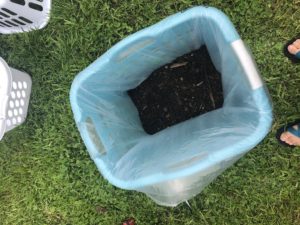
Now you’re ready to place the first round of strawberries. You can place them about six inches apart around the perimeter at the soil level. Just poke a hole into your lining material (plastic/burlap/weed mat) at each spot where you’re going to place a strawberry plant, and carefully place the plant with roots inside and foliage outside in each opening.

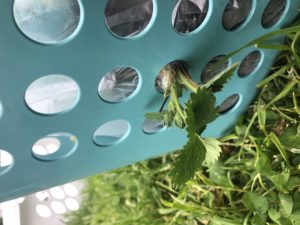
Add another 3-4″ of soil and repeat the process of planting, staggering this row of plants from the first row. Continue until you near the top of the planter. You can finish the project by planting more strawberries on top, or another crop like lettuce, kale, etc. Trim the liner material an inch or so above the soil line.
A note about watering – especially if you’re using a tall laundry basket/hamper, you might want to consider including a way for water to reach the center/bottom of the planter better. One way to do this would be to use a 2 liter soda bottle, cut off the bottom, take off the lid, poke several holes in the sides, and sink it upside-down into the top of the planter until the cut-off base sits right above the soil line. When it’s time to water, add water into this reservoir to encourage it to make its way all the way down to the center and bottom of the planter, ensuring that water reaches the roots of the lower plants, not just those on top. (We didn’t have any large soda bottles so we used the base of a plastic mango container from Costco… something longer and skinnier definitely would have worked better though.) You could also accomplish this by using a length of PVC pipe with holes drilled into it.
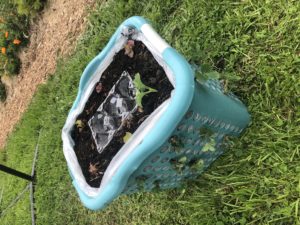
Here’s the finished planter, with about two dozen strawberry plants around the sides, and lettuce and kale on top.
If you attempt this project, please let us know how it goes!
